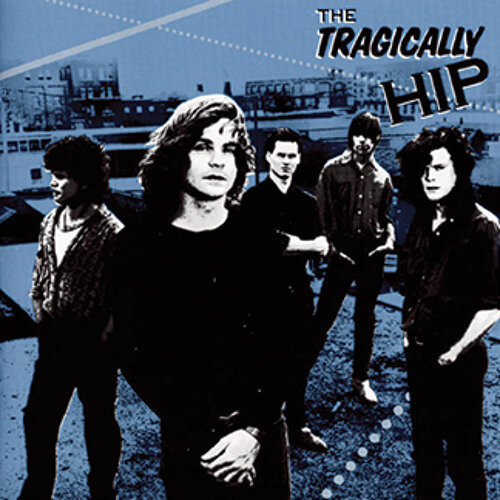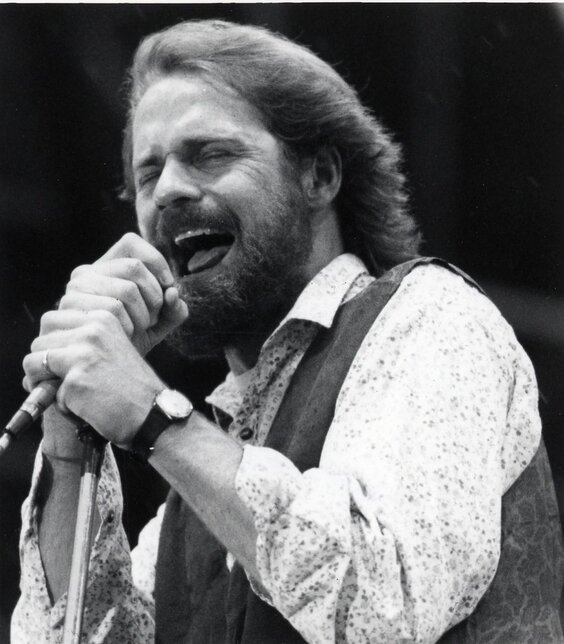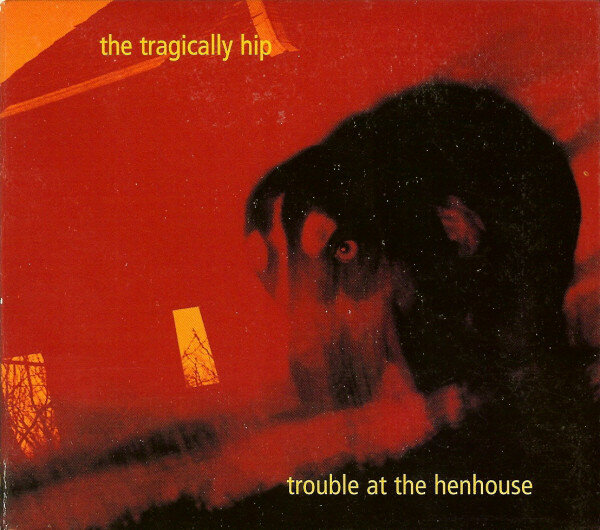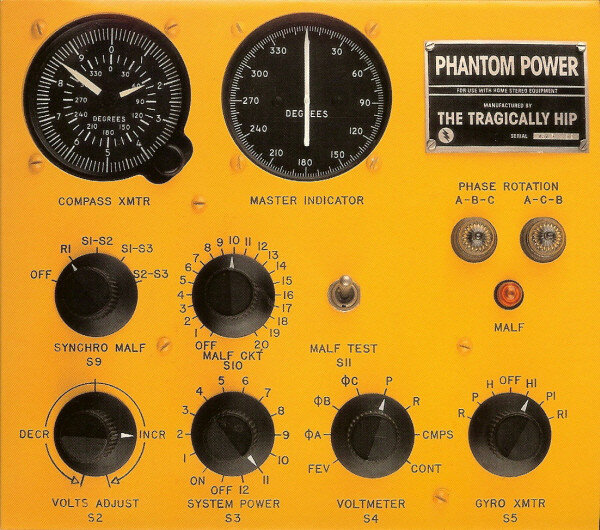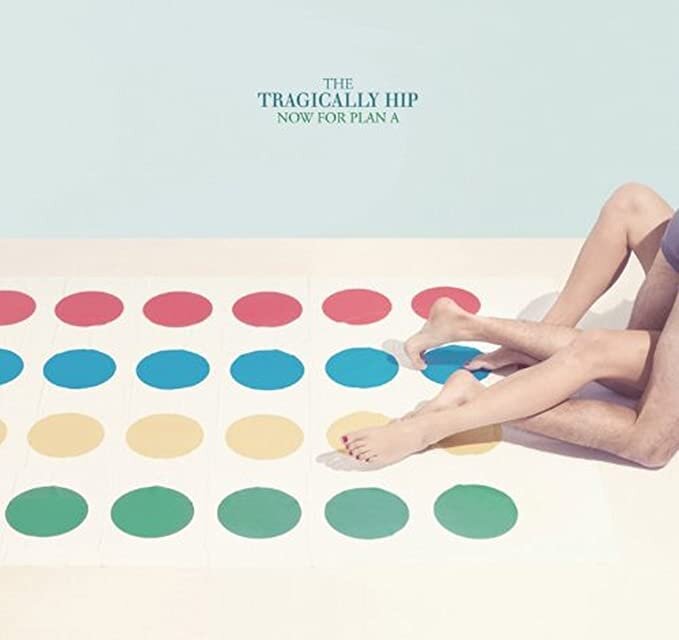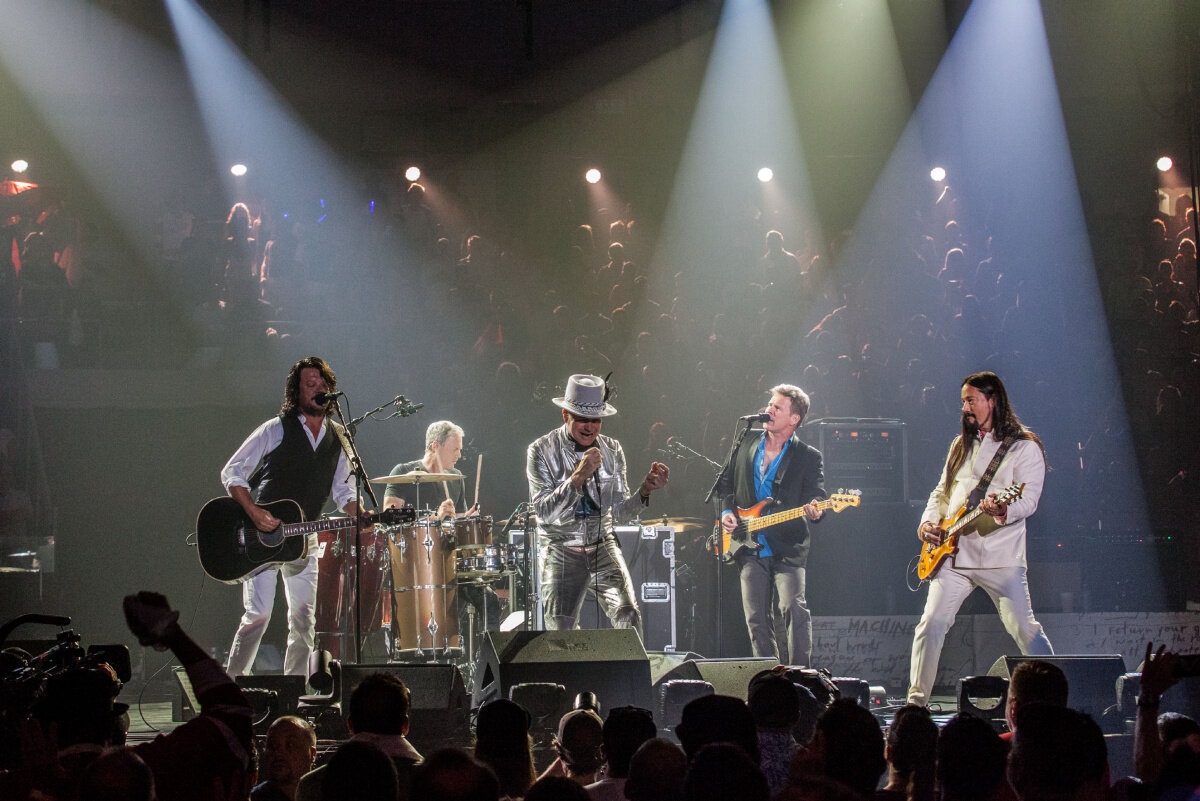Grace, Too: A Retrospective of The Tragically Hip
Click below on the streaming service of your choice to listen to the playlist as your read along.
Every country has artists that are embraced, not just as quality performers, but as the embodiment of a nation’s character. These artists become spokespersons for the values and dreams of a people. They are also often bypassed outside their countries for much the same reasons; they don’t resonate in the same way as in their homeland. Many bands sing about places and events in their country but in a way that speaks to a broader human community, and in turn brings international success, such as U2. Others are more specific, married to the vibe of their local experience, and as a result the message doesn’t translate as broadly. In this latter category would be The Tragically Hip, a band that sang about places and people that were distinctly Canadian and which endeared them to their country but left non-Canadians less engaged. It’s a shame, because few bands have put together as extensively solid a discography as The Hip, and therefore this profile is here less so for fellow Canadians – who know all this very well – but for those who have not been exposed to this tremendous group, their storied career, and heart-wrenching final chapter.
I’m inspired to write this after recently watching the tour documentary, Long Time Runnin’, which chronicled the final tour of The Tragically Hip, with its stirring circumstances of celebration and melancholy. I was slow to take up the band originally, and admittedly have found a limited supply of Canadian acts to fully embraced over my lifetime. The Tragically Hip is an exception, being a band that has been celebrated, supported, and mythologized across Canada quite possibly beyond any other act in the nation’s history – all the while being entirely ignored by the rest of the world.
The Playlist
Smalltown Bringdown
New Orleans is Sinking
38 Years Old
Twist My Arm
Long Time Running
Fiddler’s Green
Courage (for Hugh McLennan)
Locked in the Trunk of a Car
Fifty-Mission Cap
Wheat Kings
Grace, Too
So Hard Done By
Nautical Disaster
Gift Shop
Springtime in Vienna
Ahead by A Century
Sherpa
Something On
Bobcaygeon
Fireworks
Escape Is at Hand for the Travellin’ Man
My Music at Work
Tiger the Lion
It’s A Good Life if You Don’t Weaken
Throwing Off Glass
Heaven Is A Better Place Today
Gus: The Polar Bear from Central Park
The Lonely End of the Rink
In View
The Kids Don’t Get It
Pretend
Morning Moon
The Last Recluse
Coffee Girl
Man Machine Poem
About this Map
Done and Done
Man
In A World Possessed by the Human Mind
Great Soul
There will be so much good music unexplored in this playlist since The Tragically Hip delivered one album of ‘must listen’ songs after another. On the other hand, from start to finish they mostly explored the same sonic environment, so if there is a complaint, it was that they sounded too similar over their fourteen albums. Variations and some compositional experimentation were evident over the final few LPs, but the band’s core blues-rock sound was always the foundation. Within that groove, however, they could roll out quick, hard-rockin’ tunes, wonderfully easy-going, mid-tempo songs that effortlessly glided along, and beautiful, stirring slow ballads that could leave you weak in the knees. The songs selected in this playlist will try to, in a selective fashion, provide a mix of the hits and examples of the breadth of their quality craftmanship.
“Smalltown Bringdown” \ The Tragically Hip (1987)
The Tragically Hip originated out of Kingston, a mid-sized city halfway between Toronto and Montreal and at the east end of Lake Ontario, where it flows into the start of the mighty St. Lawrence River. Kingston’s location has placed it in the heart of much of Canada’s history. It was a key fort in early European settlement periods, the first Prime Minister came from there (though born in Scotland), and it was briefly the country’s first capital. The city has been noted for its proximity to large native populations, one of Canada’s top universities, several prisons, and military, shipbuilding, and aviation industries. It is a microcosm of the Canadian experience and its history, both good and bad.
In this environment grew bassist Gord Sinclair and guitarist Rob Baker, childhood friends who were playing together in bands around the Kingston bars that catered to the large student population of Queen’s University. They’d dabbled in punk and rock since the late ‘70s, and while in a band called Rick and the Rodents managed to entice the singer of another band, The Slinks, to join them, and thus Gord Downie came on board (only a Canadian band would have two Gords). Next, drummer Johnny Fay was recruited, playing his first gig with them on the same day he graduated high school, and soon after was joined by sax player, Davis Manning. They settled on one of the coolest band names ever, taken from the title of a skit from Elephant Parts, a 1981 video collection of comedy sketches from The Monkees’ Mike Nesmith. It was 1984 and The Tragically Hip was born.
In 1986, Manning left and the band would not further explore a horn sound in their music. Downie was best friends with guitarist Paul Langlois, who was planning to pursue his luck in Nashville. Gord convinced him to stick around by joining The Hip. The new quintet was set, a line-up that would incredibly remain unchanged until the band’s retirement 31 years later.
The Hip started playing bars in Toronto a few hours down the 401 highway, most notably along the big city’s Queen Street West strip. They were discovered playing at the famed Horseshoe Tavern by MCA VP, Bruce Dickinson. The record exec recognized the quality and potential of the band and they were signed to a long-term deal.
Their first release in 1987 was a self-titled EP which spawned two singles, “Smalltown Bringdown,” and “Highway Girl.” The music was generic rock, and while it is easily identifiable as The Hip from today’s perspective, at the time they would have blended in with any other bar band plying its trade across Canada. Further, after a decade highly focused on synth-infused new wave and pop along with R&B and grandiose rock bands, a stripped-down blues-rock act was a little out of step with the times. The singles and albums didn’t make a dent in the Canadian music landscape. Hindsight would show The Hip was actually a little ahead of its time.
“New Orleans is Sinking”; “38 Years Old” \ Up to Here (1989)
The promise of the band became more apparent on the second release, their first full LP, Up to Here. This time, people took notice as one solid single after another was rolled out. Yet, while the LP achieved a top ten placing in Canada’s album chart, three of the five singles took a run at the top forty but couldn’t quite pass the threshold. Yet, as they continued to play bars and small venues around the country, word started to spread about the band with an electrifying live show.
In the album’s eleven songs, the signature elements of The Hip’s sound started to be revealed. Out front was Downie’s passionate, idiosyncratic vocal carrying clever lyrics and curious turns, matched to his performance style. The music rode driving rhythms from Sinclair and Fay, which underpinned the fantastic interplay of Baker and Langlois’ guitars. The music was raw, and balanced the high energy of tracks like “Blow at High Dough” with the subdued, quiet energy of others like, “Boots or Hearts.” The band’s live energy came through in the powerful jam track, “New Orleans is Sinking.”
The Canadian references also started to appear in the song, “38 Years Old,” one of the band’s earliest standout ballads. The song chronicled a prison break from Millhaven Institution, a maximum-security prison near Kingston. Though it was fourteen escapees in 1972, the lyrics were written as “Twelve men broke loose in seventy-three” in order to fit the song and rhyme with the following line, “From Millhaven maximum security.” Though often obtuse and poetic with his lyrics, when it came to recounting events in songs, Downie had a knack for quite literal approaches.
“Twist My Arm”; “Long Time Running”; “Fiddler’s Green” \ Road Apples (1991)
Like, “Blow at High Dough” from their first LP, the band continued what would become a marker of their albums – great, powerful, rocking tunes to open their LPs. Admittedly, I detested the lead song and single from the second LP, “Little Bones.” Thanks to the growing attention their first two releases had garnered, the single nearly cracked the top ten in Canada and was a staple on rock stations across the land the summer of 1991. The tune also crossed between alternative, pop, and classic rock stations, and thanks to federal ‘Canadian content’ regulations, all were happy to give it lots of airtime. The song was unavoidable. And while many revelled in its signature line, “Two-fifty for a hi-ball / A buck and a half for a beer / Happy hour, happy hour, happy hour is here,” I found Downie’s voice grating and the music boring and derivative, and loathed that I couldn’t seem to steer clear of it. As I listened to Madchester, industrial, and shoegaze music, The Tragically Hip’s sound seemed passé and typical of the throwback nature of so much Canadian rock music. Yet I knew more than a few friends who had seen the band and testified to their brilliance, live and in studio, yet as the band grew in popularity I passed more than a few chances to see them in the small venues around Toronto in which they frequently played. So it would take me longer than most to buy into what The Tragically Hip were all about – I was probably the definition of ‘tragically hip’ at the time.
The band after getting the 1991 Entertainer of the Year award at The Junos (Canada’s music awards)
Road Apples was more polished and the songs stronger in their composition and execution, but even today I find it less appealing and more uneven than the rest of their library. “Twist My Arm” was a great, passionate blues tune, and “Three Pistols” was another solid rocker, but the album was actually more revealing of the band’s adeptness with the moody, slow ballads. “Cordelia” and “The Last of the Unplucked Gems” were wonderfully sprawling tunes, and “Fiddler’s Green” was packed with hooks, both verbal and in its stripped-down, acoustic sound. The standout was the track that would, over time, become one of the band’s many beloved tunes, “Long Time Running.” The slow build seemed to bring the quintet’s strengths into play in a taut power, restrained yet passionate. If there was any sign of the heights to which this band was headed, this was it.
The second album delivered The Hip their first of six consecutive #1 LPs in Canada, leading to a total of nine over their thirteen albums. And while Up to Here had managed a spot in the US top 200, this album couldn’t break onto the chart. US college audiences and radio stations along the border cities to Canada were developing a fervent audience for the band, such that they could tour the small venues in a select list of cities, a broader US fan base was not becoming evident. It was surprising given the late ‘80s popularity of similar US acts such as R.E.M., and perhaps this is where the unrelenting Canadian-ness of The Hip held Americans at bay. Regardless, as grunge took over the charts in the US, driving a resurgence in guitar-driven rock, The Tragically Hip found themselves no longer out of step, but right in limelight of where the popular gaze had shifted.
“Courage (for Hugh McLennan)”; “Locked in the Trunk of A Car”; “Fifty-Mission Cap”; “Wheat Kings” / Fully Completely (1992)
In the winter of 1993, I was playing pool in a bar on Queen St West with my friend, Ross, who was a Hip fan. He put money into the jukebox next to us, which had an impressive sound for such a device. Out of the speaker came the growling guitar intro of, “New Orleans is Sinking.” As the song unfurled into its full-band, swampy groove its thick bottom-end and interlaced guitar work grabbed hold of me. I was distracted from my game and by the end of the song had become a fan. I guess it just had to catch me at the right time and place, and a grungy pool hall on Queen St was a suitable place to find The Hip’s groove.
More often in those days though, it was The Tragically Hip’s songs from their new LP, Fully Completely, released late in the previous year, that were taking over the airwaves across Canada that late winter and early spring. The first two singles, “Locked in the Trunk of a Car,” and “Fifty Mission Cap,” were solid but hadn’t penetrated the wall I’d put between myself and the band. The third single, yet another of the band’s great, album opening songs, was stupendous. “Courage (for Hugh McLennan)” had such a wonderful flow it was undeniable. The song’s title referenced a Canadian author who’d passed away in 1990, and in which part of the song’s lyrics were adapted from his work. The song was their first to crack the top ten in Canada, and this time also got them top twenty spots in a couple of the US specialty charts.
Fully Completely ranks as one of the best Canadian albums ever – the first of several from The Hip to compete for such distinction. There just wasn’t a weak song on the album, with many ranking as above average to great rock songs. The band’s writing and playing were so polished, note perfect, and confident that it seemed almost un-Canadian in its swagger. Gord Downie found the balance between his sometimes-untethered utterances to a grace and power that was a perfect match to the music. This band was tight, not just in the playing, they were like a family, a cohesive unit with a common purpose that brought them well above the sum of their parts. There was a secret ingredient to this band that would hold them together artistically and as a band for another twenty-five years.
Late that summer of ’93 my brother, Aaron, returned to Toronto from having lived in Los Angeles for a few years. A huge hockey fan, he and his friend Ted were encyclopedic in their knowledge of the game, its players, and especially the stats. “Have you heard the song by The Hip about Bill Barilko?” Ted asked Aaron, which he hadn’t. Of course, Aaron knew the story of the Toronto Maple Leaf player who, in 1951 had scored the overtime, Stanley Cup winning goal. During the ensuing summer break, Barilko and others were lost when their small plane disappeared en route to a fishing trip, not to be found until eleven years later, coincidentally the same year the Leafs next won the Stanley Cup. Of course, Aaron expected the reference in the song, “Fifty Mission Cap,” to this mostly forgotten hockey player to be vague or surreptitious, but he underestimated Gord Downie’s penchant for the direct take on his subjects: “Bill Barilko disappeared that summer / He was on a fishing trip / The last goal he ever scored / Won the Leafs the cup / They didn't win another 'til 1962 / The year he was discovered / I stole this from a hockey card / I keep tucked up under / My fifty-mission cap.” I share this story as it’s a rather perfect encapsulation of how The Tragically Hip could endear themselves to its Canadian audience.
The album also referenced another famous Canadian story in the beautiful, “Wheat Kings.” David Milgaard was convicted of rape and murder in 1970 and sentenced to life. In 1992, the decision was overturned and Milgaard was released after 23 years in prison. Downie sang, “Twenty years for nothing, well, that’s nothing new / Besides, no one’s interested in something you didn’t do,” and “Late breaking story on the CBC / A nation whispers, “we always knew that he’d go free” / They add, “you can’t be fond of living in the past / ‘Cause if you are, then there’s no way that you’re going to last.” The song’s references to the CBC, the national broadcaster, Wheat Kings, a junior hockey team in Brandon, Manitoba, and “the Paris of the prairies,” a nickname for Saskatoon, the town where the murder occurred, were further Canadiana references that entrenched The Tragically Hip as chroniclers of a nation.
An unusually shaggy and blow-dried Gord Downie, performing at the first Roadside Attraction tour
Fully Completely had six singles with three reaching the top twenty in the Canadian singles chart. The Tragically Hip were the most popular band in Canada at that point, appealing to fans in rural and urban communities and among rock, pop, and alternative rock fans. Their tour in 1993 was a music and arts festival titled after the Tom Robbins novel, Another Roadside Attraction. Featuring prominent international supporting acts like Midnight Oil (Australia’s version of The Tragically Hip), and Hothouse Flowers along with reputable Canadian artists, Crash Vegas and Daniel Lanois, the tour was a sensation and put The Tragically Hip in front of much larger audiences. Outside Canada, however, they were opening acts for larger bands in the US and Europe or were playing in smaller clubs and halls. The dichotomy of their existence in and out of their country’s borders must have been jarring.
“Grace, Too”; “So Hard Done By”; “Nautical Disaster” / Day for Night (1994)
Following up such an accomplished album as Fully Completely was a tall order, and while The Hip didn’t quite manage it, they sure came close. Day for Night was another good album that offered up another impressive list of singles and entries to their growing list of outstanding songs. Again, six singles were issued with one, “Grace, Too,” reaching the top twenty and another, “Greasy Jungle,” the top ten in Canada (oddly, it’s a tune that has never stood out and serves as an example of how this album was weaker, but as is often the case, charts can be a misleading indicator between the good and the popular).
Day for Night had more solid rockers like, “Daredevil,” and the wonderful, “Nautical Disaster,” but once again the band outdid themselves with the moodier, downtempo songs. “Grace, Too” was epic, breaking their trend of opening with fast songs – though it had explosive moments – but staying true to putting a strong track in the first slot. It became one of the band’s signature tunes and a standout for their live shows, with Downie able to squeeze every bit of drama out of his delivery over quintessential performances from every band member. The album also offered, “So Hard Done By,” a snarling, sulky number that gave the band a more sinister vibe than they’d offered before. I thought it was a fantastic track that suggested the band had the potential to do more than the pop-rock formula within which they’d so capably established themselves.
By this album, when The Hip came to Canada’s large cities, they were playing in the big arenas to thousands of fans. They also reprised Another Roadside Attraction for a 1995 summer festival tour, again profiling Canadian artists such as Eric’s Trip, Rheostatics, Spirit of the West, and The Inbreds along with Jamaica’s Ziggy Marley and the Melody Makers, and US acts Blues Traveler and Matthew Sweet.
Perhaps The Hip’s best chance for an American breakthrough occurred on March 25, 1995 when they appeared on Saturday Night Live, performing “Grace, Too” and “Nautical Disaster.” They got the gig thanks to that week’s host, Canadian actor and SNL hallowed alumnus, Dan Aykroyd, who used his influence give Canada’s best secret the musical slot. Despite excellent performances it didn’t achieve the lift the band might have wished for. Whether it was their understated appearance and performance style or Gord Downie’s quirky, impassioned delivery, once again The Tragically Hip didn’t stir the interest of the American audience.
“Gift Shop”; “Springtime in Vienna”; “Ahead by A Century”; “Sherpa” / Trouble at the Henhouse (1996)
While Day for Night had offered a more nuanced, darker side of The Tragically Hip, 1996’s Trouble at the Henhouse, the band’s fifth album, showed they were still a machine when it came to churning out accessible, fun rock in addition to songs with subtle, beautiful turns. The album rivalled Fully Completely as their most complete and, perhaps, surpassed it in the consistently high quality of the music from start to finish. It was another mammoth contribution to Canada’s musical history.
The album produced five singles, with “Ahead by A Century” giving them their first #1 single in Canada, and “Gift Shop” their third top ten. Two more singles reached the top twenty and the fifth cracked the top forty. Yet none of the singles stood too tall on the album, as they were surrounded by another seven cracking tunes. The rockers seemed a little edgier and the slow songs more stirring, such that the big hit, the straightforward “Ahead by A Century,” seemed a bit dry compared to the rest. Regardless, it was a great song and understandably became yet another of their most beloved songs.
Songs like “Springtime in Vienna,” “Flamenco,” and “Sherpa” revealed the band breaking out of their formula a little more, experimenting in pace, texture, and mood more fully than prior albums; while “700 Foot Ceiling” and “Coconut Cream” presented the band in tougher and harsher rock styles. These wider variations made the album their most gratifying listen to date.
1997 saw the final round for The Hip’s festival tour, Another Roadside Attraction. Again, prominent artists like Sheryl Crow, Los Lobos, and Wilco were mixed with Canadian artists such as Ron Sexsmith, Change of Heart, and Ashley MacIsaac. This tour included the only ever non-Canadian dates for the festival, with shows at Darien Lake near Buffalo, New York, and at Highgate, Vermont, on the Canadian border just southeast of Montreal.
The Hip (L to R): drummer Johnny Fay, guitarist Rob Baker, singer Gord Downie, guitarist Paul Langlois, and bassist Gord Sinclair
“Something On;” “Bobcaygeon”; “Fireworks”; “Escape Is at Hand for the Travellin’ Man” / Phantom Power (1998)
Phantom Power was The Tragically Hip’s sixth album and their fifth consecutive #1 in Canada. To me, it was their fourth consecutive smash, sustaining an impossibly consistent and high quality of output. 1998 was a rough time for me, and this album was one of a few in which I turned for help in coping.
I loved the honky-tonk-punk energy of “Fireworks” with the blissfully wonderful Canadiana and hockey-based, lyrics, “If there's a goal that everyone remembers / It was back in ol' 72 / We all squeezed the stick and we all pulled the trigger. And all I remember is sitting beside you / You said you didn't give a fuck about hockey / And I never saw someone say that before / You held my hand and we walked home the long way / You were loosening my grip on Bobby Orr.” Just a few lines, delivered at a breathless pace, referenced the Canada-Russia Hockey series of 1972 (a seminal moment in Canadian history) and the power of romance to turn a man’s eye from their sports heroes to other interests. To this day, I smile every time I hear, “you said you didn’t give a fuck about hockey / And I never saw someone say that before. Brilliant.
The album also brought one of the loveliest ballads ever to the Canadian songbook, bringing fame to a popular Ontario cottage town, juxtaposed against the hate and racial tensions that can exist in a big city like Toronto. “Bobcaygeon” is one of mine, and countless other Canadians, favourite songs. The selection of the town for the song was happenstance, since it was a name that rhymed with “constellation,” the end of the lovely verse in the song – “When I left your house this morning / It was a little after nine / It was in Bobcaygeon, I saw the constellations / Reveal themselves, one star at a time.” In 2011, the band played in that small town of 2,500 people among the Kawartha Lakes, setting up in a farmer’s field to play to 25,000 people drawn from all over Canada for the auspicious moment, which was captured in the 2012 documentary film, Bobcaygeon.
Phantom Power was another LP of hard to avoid songs that grabbed you at every turn, for different reasons, and that took you on a wonderful musical journey. The album led with another strong tune, “Poets” which as the first single also reached the top ten, as did “Fireworks” and “Bobcaygeon” as the third and fourth singles. “Something On,” the second single didn’t do as well though it deservedly should have.
“My Music at Work”; “Tiger the Lion” / Music@Work (2000)
The Tragically Hip kicked off the new century with their seventh LP, released in June. It would be their sixth consecutive #1 LP in Canada, but again failed to gain ground in the US charts. After the outstanding quality of their prior four albums, Music@Work came in a notch lower. Their consummate sound was there, mixing rockers with their lovely ballads, but it was all a little too familiar and lacked any outstanding tracks.
Though the album’s title dated itself with the ‘@’ symbol, referencing the new age of digital communications, the album’s title track was a variant on the phrase, “My Music at Work.” It was the album’s strongest tune, its lead single, and naturally kicked off the album in the first slot. The rocking tune, however, failed to keep the band’s singles momentum, just missing the top forty in Canada. It made Music@Work the first LP not to have a top forty single since their first, Up to Here, eleven years prior, nor a top ten single in Canada since Road Apples nine years before.
In 2000, rock music was declining in prominence, and though there would be a resurgence in the US in the years coming, rock ‘n’ roll would struggle to maintain a leading place in the music universe. The fate of The Tragically Hip would follow this arc, even in its beloved Canada, though only in relevant terms – this band would always be popular.
“It’s A Good Life if You Don’t Weaken”; “Throwing Off Glass” \ In Violet Light (2002)
Issued two years later, at the same pace of release as their prior four LPs, In Violet Light was the first album in a decade to not reach #1 in Canada – though with a #2 spot, it wasn’t as if the band fell back much. However, like its predecessor, only one single charted and only just cracked the top forty. Now ensconced as one of the greatest acts of Canadian rock history, the band appeared to be entering into elder statesmen territory – loved, well-attended in concert, and respected; but no longer at the vanguard of popular trends and, increasingly, commercially marginalized. However, their stature was recognized when they were invited for a command performance for Queen Elizabeth in October 2002.
While In Violet Light failed to offer any rocking songs commensurate to their 1990s heyday, it did provide more of their beautiful mid- to low-tempo songs, most notably in the album’s lead single, “It’s A Good Life if You Don’t Weaken,” which joined their list of impressive ballads. Built on restrained energy, the song shimmered under a beautiful guitar line offset by Downie’s fantastic vocal. It built gradually to an effortless release, shifting tempos while carrying the twinkling guitar throughout. Even if the band’s sales were falling, especially in the emerging age of digitization and file-sharing, that song reminded of their impressive talent.
The Tragically Hip established their brand with their renowned live shows, right to their very last
“Heaven Is A Better Place Today”; “Gus: The Polar Bear from Central Park” \ In Between Evolution (2004)
If there was ever a signal of how things were changing for The Tragically Hip, it was to see their new LP debut at #1 in Canada only to be knocked out of the top spot the following week by seventeen year-old Avril Lavigne’s debut juggernaut, Let Go. It was a changing of the guard.
Along with its brief stay at the top of the chart the album failed to chart any of its three singles, continuing the gradual decline of the band’s commercial stature. It was too bad because with In Between Evolution, the band kicked it up a notch and released a strong LP, full of more engaging rockers than their prior two albums. If the band was suffering from any shortcomings, it was that they were as familiar as a band could get with its audience, both casual and hardcore. The songs were good, but they were more of the same, and for a ninth album the sense of urgency in continuing to engage was lessening for the fans.
“The Lonely End of the Rink”; “In View”; “The Kids Don’t Get It”; “Pretend” \ World Container (2006)
Reliably, two years (and a bit) later came The Hip’s tenth LP. Peaking at #2 and again not charting any singles, it saw the band continue to ride along as a cherished act among Canadians but ignored every where else – twas ever thus. It was to everyone else’s loss as World Container was the best LP the band had issued since Phantom Power eight years earlier. The consistent quality of the songs was impressive and, while still in their familiar sound, there was an increased polish and strength in the songs, as if the band had a renewed purpose.
The songs had new hooks and slightly off-kilter turns from their core rock sound, grabbing the ear much the same as they had done with their string of standout albums over the back half of the 1990s. “The Lonely End of the Rink” had, along with their typical Canadiana references, some exciting tempo changes that propelled the song in ways they hadn’t done before. It was, fittingly, debuted via the weekly national hockey broadcast, Hockey Night in Canada. Similarly, “In View” saw the band employing a purer pop sensibility that almost seemed foreign to their sound – and got them some chart love from Billboard’s Canadian rock chart, hitting #1. And in “The Kids Don’t Get It” the band’s – er, Downie’s – passion was married to a bouncy rhythm comparable to fellow Canadian, Sam Roberts, who was enjoying success with his second top ten LP that year employing his infectious, jaunty rhythms. “Pretend” offered up another stirring ballad along with a melodic, piano-laced turn, once again a little further off the band’s beaten path.
World Container was exactly what The Hip needed to do at that point in their career. They were pushing their boundaries, expanding their sound, and offering new views on their established sound.
“Morning Man”; “The Last Recluse”; “Coffee Girl” \ We Are the Same (2009)
Breaking their pace, The Tragically Hip waited two-and-a-half years before releasing their next LP, We Are the Same, and it continued to see them vary their sound and style. Perhaps resigning themselves to no longer being able to conquer the charts and rack up the sales – though, of course, the album did reach #2 in Canada (with far less sales than it once took) – the band came across as a more mature, settled, and polished band.
“Morning Moon” kicked off the album with a country twist, riding a lovely pace and a sweet, melodic line that harkened back to Canada’s deep pop-country tradition. It could have fit on a Blue Rodeo album or have been nicely paired with Neil Young’s version of “Four Strong Winds.” “The Last Recluse” was yet another strong ballad, featuring a powerful vocal hook from Downie. And though not released as a single, the album included one of my favourite Hip songs, “Coffee Girl,” a beautiful mix of their rock and ballad sound, with a little trumpet thrown in for something different, and of course fantastic lyrics that captured the mood of the song and its story. The catchy break-beat also offered a new twist on their sound, it was a simple yet brilliant song.
The album’s lead single, “Love is A Fist,” oddly one of the weaker songs on the album (though still a different vibe for the band), saw the band return to the top forty on Canada’s singles charts – its #22 peak being the highest since “Bobcaygeon” in 1999.
“Man Machine Poem”; “About this Map”; “Done and Done” \ Now for Plan A (2012)
After another two-and-a-half-year gap, The Hip returned with their twelfth album, Now for Plan A. As a sign of the times, they made it available for free online a week before its release for sale. Peaking at #3, it was their first LP to not reach the top two on the Canadian album chart since their debut, a long twenty-three years ago. None of the three singles cracked the top forty.
“Man Machine Poem” was the album’s second track and saw the band rocking in a broader, more epic style than usual. Again, it saw The Hip expanding into different strains of their traditional rock sound. “About this Map” and “Done and Done” were a pair of stirring slow tunes as only The Hip could deliver, putting intriguing little hooks and turns into them that evolved from their already high standards for such tunes.
The Tragically Hip had released three consecutive impressive albums, evolving, maturing, and broadening their sound while still anchored to their core rock foundations. The LPs were as strong musically as their pinnacle commercial successes of the ‘90s, but without the radio and chart support hadn’t enmeshed themselves into the Canadian psyche as those seminal albums. The country hadn’t forgotten them – a core audience still lapped up their LPs and their shows always sold out – but for their broader fanbase, The Hip was like a dear, old friend that hadn’t been connected with in quite a while. That was about to change.
“Man”; “In A World Possessed by the Human Mind”; “Great Soul” \ Man Machine Poem (2016)
The Tragically Hip’s thirteenth, and final, LP was released almost four years after its predecessor. It was the longest gap between albums in their career and reflected a band shifting in its priorities, both musically and in its career.
Gord Downie had always done outside work, and in 2014 had released his fourth solo album, this time recorded with Canadian country-blues-rock act, The Sadies. He had also recorded another, yet unreleased album, Secret Path, focused around his work championing the rights and needs of Canada’s indigenous population. Also, for the band members, passing their fiftieth birthdays, easing up on the schedule was probably an attractive proposition, especially since touring endlessly was the only way to make a buck in the modern music world. The band also was pushing their music towards a more progressive, experimental sound, continuing the trajectory set out over the prior three LPs. Taking all those factors into account, an extra year or two to put the next LP together made sense.
In December 2015, Gord Downie was diagnosed with an incurable brain cancer, proceeding into radiation and chemotherapy treatment. In the spring of 2016, coming out of treatment and facing an uncertain timeline, he surprised his band by asserting that he wanted to tour one last time. It was an incredible proposition, and one the band entered into with great trepidation. Early rehearsals were discouraging as Gord’s mental and physical state didn’t seem steady enough to perform for any length of time, much less carry an entire tour. It was the start of one of the most incredible stories in rock history, and a stirring climax for a beloved band.
On May 24, 2016, Downie’s condition was made public along with the news that the band would undergo a ten city, fifteen show Canadian tour. This was to be a farewell tour unlike any other. There was no prospect of a reunion and further shows; this was to be a communal, cathartic experience for Downie, the band, and its legions of fans across the country. The tour sold out in minutes amidst controversy over how tickets were allocated and likely scooped up by automated bots.
Man Machine Poem album cover
On June 17, the album, Man Machine Poem, was released. It had originally been titled, Dougie Stardust, a humourous spin on the Bowie album, but when Bowie died in January and Downie underwent his treatment, it was clear the album needed a different name. The title of the song from their prior album was chosen. The album again built on their blues-rock formula but explored more textures, pacing, and tones. Leading with the brooding, slightly psychedelic, “Man,” it gave the album a suitably ominous start. “In A World Possessed by the Human Mind” saw the band lean into their classic sound, propelled by an insistent beat. “What Blue” was another stirring, bluesy ballad, such as the band could effortlessly deliver at this point. “Great Soul” seemed to channel the sounds of their early days, refreshed with a modern edge. The back half of the album featured some intriguing, edgy ventures for The Hip such as “Hot Mic” and “Ocean Next.”
The album returned The Tragically Hip to #1 in Canada as the incredible story and impending tour focused the nation on its cherished quintet with their enigmatic lead singer. The country embraced the band with its collective arms. The tour began in late July, accompanied by a medical team monitoring Gord Downie throughout, who amazingly performed all the shows without issue, delivering a final set of impressive performances driven by his idiosyncratic and passionate delivery – fashioned with various scarves tied around his neck made from socks. The scene of a dying man singing in front of thousands of people, many of which cried uncontrollably as shows ended, was as uniquely and compelling a tableau as could be conceived.
On August 20, the final show was played in The Tragically Hip’s hometown of Kingston in an arena with a capacity of just 7,000 for a show in which an entire nation needed to watch. It was broadcast live nationally – interrupting coverage of the Olympics – and watched by an estimated twelve million people (34% of Canada’s population). Viewing locations were set up in town squares, arenas, bars, and community halls across the country. Canada’s Olympians watched from Brazil and Prime Minister Trudeau attended the show and embraced the band prior to them taking the stage. I watched it with my family – even with my mother, who likely hadn’t watched a rock concert in her life – stirred by the bittersweet sense of occasion this event represented. To see Downie and the band finish the show and wave goodbye to the fans, and the country, was one of the most emotional moments I’ve witnessed in music.
The final show…
Downie’s Secret Path album and accompanying graphic novel were released in the fall of 2016 and he did a few live shows in support of it, performing his last ever concert at Toronto’s Roy Thomson Hall in October 2016. The Tragically Hip were appointed a member of the Order of Canada, the country’s highest honour, in June 2017. Downie passed away the following October, just over a year from his stirring conclusion with his band. His final solo album, Introduce Yerself, was issued just ten days after his death.
It’s reported The Tragically Hip have a treasure trove of recorded material in songs and the band has indicated there will likely be new music to be released at some point. Naturally, they’re sensitive of how to handle it. Gord Sinclair released a solo album in February 2020, but otherwise it remains to be seen what will come of The Tragically Hip and its remaining members. They have not announced a formal dissolution of the band, and as of this writing Downie’s Twitter account has become active and started hinting at the possible release of a new song.
The Tragically Hip are cherished icons of their country, having achieved a heightened status thanks to their many great albums, loyal fans, affinity to the character and history of their country, and incredibly affecting final tour. They charted their own course throughout their career, staying true to their sound while both perfecting and expanding it. They were modest, loyal, professional, polished, and very good – a band Canadians of every stripe could relate to, embrace, and share with a very un-Canadian boastfulness. The Tragically Hip were Canada’s own in every way, and if the rest of the world ever deems to catch on, they will be shared with the generosity of spirit in which the band embodied.






